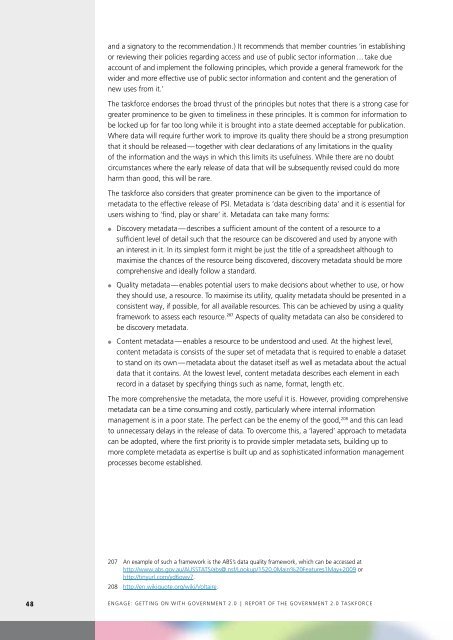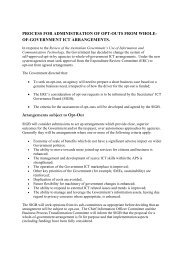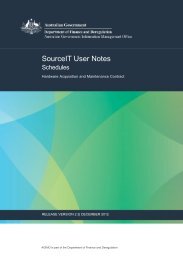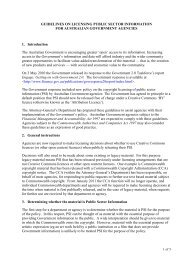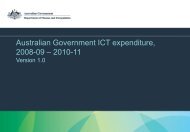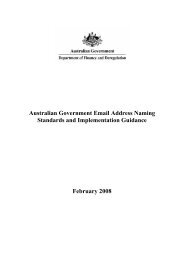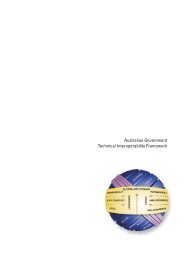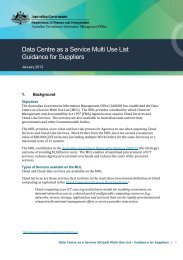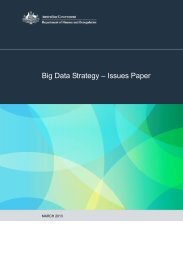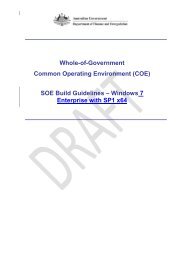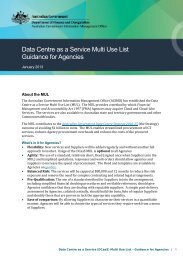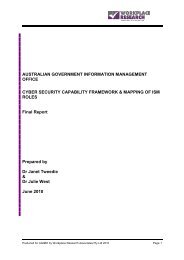Getting on with Government 2.0 - Department of Finance and ...
Getting on with Government 2.0 - Department of Finance and ...
Getting on with Government 2.0 - Department of Finance and ...
You also want an ePaper? Increase the reach of your titles
YUMPU automatically turns print PDFs into web optimized ePapers that Google loves.
<strong>and</strong> a signatory to the recommendati<strong>on</strong>.) It recommends that member countries ‘in establishing<br />
or reviewing their policies regarding access <strong>and</strong> use <strong>of</strong> public sector informati<strong>on</strong> … take due<br />
account <strong>of</strong> <strong>and</strong> implement the following principles, which provide a general framework for the<br />
wider <strong>and</strong> more effective use <strong>of</strong> public sector informati<strong>on</strong> <strong>and</strong> c<strong>on</strong>tent <strong>and</strong> the generati<strong>on</strong> <strong>of</strong><br />
new uses from it.’<br />
The taskforce endorses the broad thrust <strong>of</strong> the principles but notes that there is a str<strong>on</strong>g case for<br />
greater prominence to be given to timeliness in these principles. It is comm<strong>on</strong> for informati<strong>on</strong> to<br />
be locked up for far too l<strong>on</strong>g while it is brought into a state deemed acceptable for publicati<strong>on</strong>.<br />
Where data will require further work to improve its quality there should be a str<strong>on</strong>g presumpti<strong>on</strong><br />
that it should be released — together <strong>with</strong> clear declarati<strong>on</strong>s <strong>of</strong> any limitati<strong>on</strong>s in the quality<br />
<strong>of</strong> the informati<strong>on</strong> <strong>and</strong> the ways in which this limits its usefulness. While there are no doubt<br />
circumstances where the early release <strong>of</strong> data that will be subsequently revised could do more<br />
harm than good, this will be rare.<br />
<br />
The taskforce also c<strong>on</strong>siders that greater prominence can be given to the importance <strong>of</strong><br />
metadata to the effective release <strong>of</strong> PSI. Metadata is ‘data describing data’ <strong>and</strong> it is essential for<br />
users wishing to ‘find, play or share’ it. Metadata can take many forms:<br />
●●<br />
●●<br />
●●<br />
Discovery metadata — describes a sufficient amount <strong>of</strong> the c<strong>on</strong>tent <strong>of</strong> a resource to a<br />
sufficient level <strong>of</strong> detail such that the resource can be discovered <strong>and</strong> used by any<strong>on</strong>e <strong>with</strong><br />
an interest in it. In its simplest form it might be just the title <strong>of</strong> a spreadsheet although to<br />
maximise the chances <strong>of</strong> the resource being discovered, discovery metadata should be more<br />
comprehensive <strong>and</strong> ideally follow a st<strong>and</strong>ard.<br />
Quality metadata — enables potential users to make decisi<strong>on</strong>s about whether to use, or how<br />
they should use, a resource. To maximise its utility, quality metadata should be presented in a<br />
c<strong>on</strong>sistent way, if possible, for all available resources. This can be achieved by using a quality<br />
framework to assess each resource. 207 Aspects <strong>of</strong> quality metadata can also be c<strong>on</strong>sidered to<br />
be discovery metadata.<br />
C<strong>on</strong>tent metadata — enables a resource to be understood <strong>and</strong> used. At the highest level,<br />
c<strong>on</strong>tent metadata is c<strong>on</strong>sists <strong>of</strong> the super set <strong>of</strong> metadata that is required to enable a dataset<br />
to st<strong>and</strong> <strong>on</strong> its own — metadata about the dataset itself as well as metadata about the actual<br />
data that it c<strong>on</strong>tains. At the lowest level, c<strong>on</strong>tent metadata describes each element in each<br />
record in a dataset by specifying things such as name, format, length etc.<br />
The more comprehensive the metadata, the more useful it is. However, providing comprehensive<br />
metadata can be a time c<strong>on</strong>suming <strong>and</strong> costly, particularly where internal informati<strong>on</strong><br />
management is in a poor state. The perfect can be the enemy <strong>of</strong> the good, 208 <strong>and</strong> this can lead<br />
to unnecessary delays in the release <strong>of</strong> data. To overcome this, a ‘layered’ approach to metadata<br />
can be adopted, where the first priority is to provide simpler metadata sets, building up to<br />
more complete metadata as expertise is built up <strong>and</strong> as sophisticated informati<strong>on</strong> management<br />
processes become established.<br />
207 An example <strong>of</strong> such a framework is the ABS’s data quality framework, which can be accessed at<br />
http://www.abs.gov.au/AUSSTATS/abs@.nsf/Lookup/1520.0Main%20Features1May+2009 or<br />
http://tinyurl.com/yd6owv7.<br />
208 http://en.wikiquote.org/wiki/Voltaire.<br />
48<br />
Engage: <str<strong>on</strong>g>Getting</str<strong>on</strong>g> <strong>on</strong> <strong>with</strong> <strong>Government</strong> <strong>2.0</strong> | report <strong>of</strong> the government <strong>2.0</strong> taskforce


